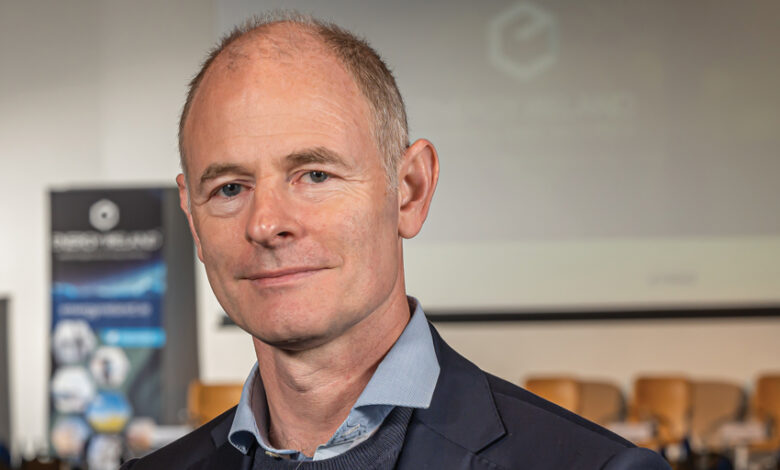Aiming for Ireland to be among world’s top 10 digital states

Minister of State at the Department of Public Expenditure and Reform with responsibility for Public Procurement and eGovernment Ossian Smyth TD discusses about Ireland’s plans to place itself among Europe’s leading states in the field of digital government.
“By the end of this decade, my ambition is that Ireland will be consistently ranked among the top three EU digital nations and ranked amongst the top 10 nations in the world,” Smyth says. “Over the last few years, the pandemic enforced such fundamental changes to how we live and work that we have come to the point that much of what we did during that period is now a routine part of our lives. Technology has been a key enabler to those changes.”
The Government has seen a “seismic shift” in the availability and uptake of digital government services since the pandemic, with two particular lessons for the Government in the reaction to decisions taken at the time. The first, Smyth says, was that the people of Ireland showed a willingness and ability to quickly adapt to the digital world when the importance and benefits of doing so are made clear to them. “It was great how quickly we adapted to using the Covid app, for example,” he says. “People were booking their vaccination appointments online and downloading their certificates to their phone wallets and that allowed us to travel and to avail of hospitality in pubs and restaurants.”
The second lesson for Smyth was that the Irish people showed trust in their government in “making the decisions in the best interests of the State”. “In fact, Ireland has been ranked first for public trust in the use of data by governments in the OECD trust survey,” he says. “This is of significant importance to this debate around digital government.”
Harnessing Digital and Connecting Government 2030
Of course, developments in digital government in Ireland take place against a backdrop of the European Union’s Digital Decade. February 2022 saw the Irish Government lay out its response to the European plans, Harnessing Digital: The Digital Ireland Framework. The framework “aims to drive and to enable the digital transition across the Irish economy and society” and has four pillars: digital transformation of business; digital infrastructure; skills; and digitisation of public services. Following in March 2022 was Connecting Government 2030, the digital and ICT strategy for Ireland’s public services.

“A key focus is going to be on delivering public services taking a digital by default approach through collaboration with stakeholders and the public. We are building towards 90 per cent online uptake of key public services in line with the targets set out by the EU.”
Minister of State Ossian Smyth TD
“We have really developed well against our expectations for digital government over the last number of years and we have put in place the foundations of a strong digital government ecosystem,” Smyth says. “In the coming years, we want to see ease of access to government services and to have greater integration across those services. Connecting Government 2030 is going to help us to achieve this ambition. A key focus is going to be on delivering public services taking a digital by default approach through collaboration with stakeholders and the public. We are building towards 90 per cent online uptake of key public services in line with the targets set out by the EU.
“Digital transformation means redesigning and rebuilding of government processes and services, across organisations if necessary, and then using digital information and data to create an integrated experience for our people, businesses, and policymakers. This will require digitalisation, underpinned by ICT, to be part of policymaking and public service design processes from the outset in order to achieve more user-focused outcomes. We have to ensure that, in digitalising our public services, that we take user first and business first approaches. The benefits of a digital transformation of public services to both individuals and businesses are by now well established; these include efficiency, transparency, trust, and accessibility. There is also a correlation between strong digital government performance and strong digital economies.”
Connecting Government 2030 identifies six priority action areas: a human-driven digital experience through understanding users and their needs; harnessing data effectively; government as a platform, driving service simplification to “an ecosystem of standards, resources, and tools including the amplification of the once-only principle; evolving through innovation; strengthening digital skills and developing new capabilities and skills; and focusing on governance and leadership will drive digital transformation across government.
“In taking forward Connecting Government 2030, it is important that we listen to the voices of our stakeholders and understand their preferences and wants,” Smyth says. “That is why, in the last few months, I have been seeking out people’s views through a public consultation on their experiences and priorities for digital government services. I expect that we are going to get some interesting insights and feedback, which will allow us to formulate our plan for the coming year. In gathering those opinions, we did not just advertise for people to come to us, we went to them to ensure that we would not be limited in our sample. We asked people what areas were working well, and which areas needed improvement.”
‘Nobody left behind’
Smyth also says that the digital by default approach “does not mean digital only” and, to that end, his department is working in conjunction with other departments to develop a digital inclusion roadmap that will, along with the extended access to the internet provided under the National Broadband Plan, ensure that “nobody is left behind”. Those who cannot or do not use the internet will be “better served through focused supports, including skills, infrastructure, and assisted digital supports, with consideration of the most appropriate service delivery channels and the development of clear consenting protocols”.
Concluding, the Minister of State looks to the future with a sense of optimism and ambition for Ireland’s digital government transformation: “The coming years will all be about building on our strong foundations and creating a world-leading digital government service. We will be implementing Connecting Government 2030 and it will take all of government to deliver its ambitious outcomes.”





